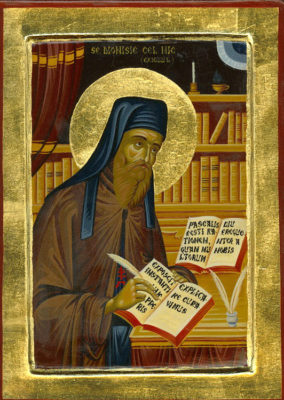Dionysius Exiguus
 Dionysius Exiguus (Latin for "Dionysius the Humble"; Greek: Διονύσιος; – ) was a 6th-century Eastern Roman monk born in Scythia Minor. He was a member of a community of Scythian monks concentrated in Tomis (present-day Constanța, Romania), the major city of Scythia Minor. Dionysius is best known as the inventor of Anno Domini (AD) dating, which is used to number the years of both the Gregorian calendar and the (Christianised) Julian calendar. Almost all churches adopted his ''computus'' for the dates of Easter.
Dionysius Exiguus (Latin for "Dionysius the Humble"; Greek: Διονύσιος; – ) was a 6th-century Eastern Roman monk born in Scythia Minor. He was a member of a community of Scythian monks concentrated in Tomis (present-day Constanța, Romania), the major city of Scythia Minor. Dionysius is best known as the inventor of Anno Domini (AD) dating, which is used to number the years of both the Gregorian calendar and the (Christianised) Julian calendar. Almost all churches adopted his ''computus'' for the dates of Easter.From around the year 500 until his death, Dionysius lived in Rome. He translated 401 Church canons from Greek into Latin, including the Apostolic Canons and the decrees of the First Council of Nicaea, First Council of Constantinople, Council of Chalcedon, and Council of Sardica, and a collection of the decretals of the popes from Siricius to Anastasius II. These ''Collectiones canonum Dionysianae'' had great authority in the West, and they continue to guide church administrations. Dionysius also wrote a treatise on elementary mathematics.
The author of a continuation of Dionysius's ''Computus'', writing in 616, described Dionysius as a "most learned abbot of the city of Rome", and the Venerable Bede accorded him the honorific ''abbas'' (which could be applied to any monk, especially a senior and respected monk, and does not necessarily imply that Dionysius ever headed a monastery; indeed, Dionysius's friend Cassiodorus stated in ''Institutiones'' that he was still an ordinary monk late in life). Provided by Wikipedia
Showing 1 - 20 results of 25 for search 'Dionysius Exiguus', query time: 0.06s
Refine Results
In addition to media from the THWS, media from other Bavarian libraries are also displayed.
These are marked with the "Interlibrary loan" label and can be ordered by clicking on them.
These are marked with the "Interlibrary loan" label and can be ordered by clicking on them.
-
1
Praefatio ad Gaudentium abbatem in Marcelli archimandritae relationem de inventione capitis Iohannis Baptistae by Dionysius Exiguus
Call Number: Loading…Get full text
Located: Loading…
Electronic Book Chapter -
2
Praefatio ad Hormisdam papam (seu Praefatio in Canonum Graecorum translationem alteram) by Dionysius Exiguus
Call Number: Loading…Get full text
Located: Loading…
Electronic Book Chapter -
3
Praefatio ad Pastorem abbatem in Vitam sanctae Thaisis by Dionysius Exiguus
Call Number: Loading…Get full text
Located: Loading…
Electronic Book Chapter -
4
Praefatio ad Dominam venerandam in Vitam sancti Pachomii by Dionysius Exiguus
Call Number: Loading…Get full text
Located: Loading…
Electronic Book Chapter -
5
Praefatio ad Eugipium presbyterum in versionem libri Gregorii Nysseni de conditione hominis by Dionysius Exiguus
Call Number: Loading…Get full text
Located: Loading…
Electronic Book Chapter -
6
Praefatio ad Petrum episcopum in epistulam encyclicam Cyrilli Alexandrini by Dionysius Exiguus
Call Number: Loading…Get full text
Located: Loading…
Electronic Book Chapter -
7
Exempla sanctorum patrum by Dionysius Exiguus
Call Number: Loading…Get full text
Located: Loading…
Electronic Book Chapter -
8
Praefatio ad Felicianum et Pastorem in Procli Constantinopolitani Tomum ad Armenos by Dionysius Exiguus
Call Number: Loading…Get full text
Located: Loading…
Electronic Book Chapter -
9
Praefatio ad Iohannem et Leontium by Dionysius Exiguus
Call Number: Loading…Get full text
Located: Loading…
Electronic Book Chapter -
10
Praefatio ad Iulianum presbyterum in Collectionem Decretorum Romanorum pontificum by Dionysius Exiguus
Call Number: Loading…Get full text
Located: Loading…
Electronic Book Chapter -
11
Praefatio ad Stephanum episcopum in Canonum Graecorum translationem primam by Dionysius Exiguus
Call Number: Loading…Get full text
Located: Loading…
Electronic Book Chapter -
12
Praefationes latinae genuinae in variis suis translationibus ex graeco by Dionysius Exiguus 470-540
Published 1972Call Number: Loading…
Located: Loading… -
13
A clear and learned explication of the history of our blessed Saviour Jesus Christ taken out of above thrity Greek, Syriack, and other Oriental authors, by way of Catena: by Dionys... by Dionysius Exiguus 470-540
Published 1695Call Number: Loading…Get full text
Located: Loading…
-
14
The exposition of Dionysius Syrus written above 900 years since on the evangelist St. Mark : the titles whereof are set down immediately after the Epistle to the reader, with refer... by Dionysius Exiguus 470-540
Published 1672Call Number: Loading…Get full text
Located: Loading…
-
15
Collectio canonum Dionysio-Hadriana - BSB Clm 14422 by Dionysius Exiguus 470-540
Call Number: Loading…
Located: Loading… -
16
Dionysii Exigui, Viventioli, Trojani, Pontiani, S. Caesarii, Arelatensis episcopi, Fulgentii Ferrandi et Rustici quorum prior Carthaginensis, posterior Romanae ecclesiae diaconus,... by Dionysius Exiguus 470-540, Viventiolus Lugdunensis ca. um 520/537
Published 1848Call Number: Loading…Get full text
Located: Loading…
-
17
Dionysius Exiguus: Corpus canonum - BSB Clm 29552(1 by Dionysius Exiguus 470-540
Call Number: Loading…
Located: Loading… -
18
Dionysius Exiguus: Corpus canonum - BSB Clm 29552(2 by Dionysius Exiguus 470-540
Call Number: Loading…
Located: Loading… -
19
Codex Canonvm Ecclesiasticorvm Dionysii Exigvi by Dionysius Exiguus 470-540
Published 1628Call Number: Loading…
Located: Loading… -
20
Alkuin, De virtutibus et vitiis [u.a.] - Staatsbibliothek Bamberg Msc.Patr.2 by Alkuin 735-804, Dionysius Exiguus 470-540, Augustinus, Aurelius Heiliger 354-430
Call Number: Loading…
Located: Loading…
